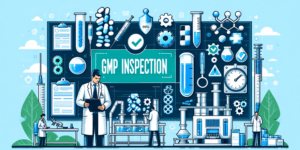Importance of GMP inspections for pharmaceutical companies

In the highly regulated pharmaceutical industry, ensuring a high standard of quality and compliance is paramount, This is where GMP Inspections come into play. GMP inspections are conducted by regulatory authorities to assess whether pharmaceutical companies are following the guidelines and procedures necessary to produce safe and effective drugs.
GMP inspections serve as a crucial means of maintaining quality control and ensuring patient safety. By adhering to GMP regulations, pharmaceutical companies demonstrate their commitment to producing safe and effective drugs. These inspections help to identify any deficiencies or non-compliance issues within the manufacturing process, allowing companies to take corrective actions and improve their operations.
Furthermore, GMP inspections play a vital role in building trust and confidence among healthcare professionals and patients. When a pharmaceutical company successfully passes a GMP inspection, it signifies that their products meet the required standards and can be trusted for use.
Overall, GMP inspection is not just a legal requirement but also a way for pharmaceutical companies to reinforce their commitment to patient safety and product quality.
GMP inspection process and guidelines
During a GMP inspection, regulatory authorities evaluate various aspects of the pharmaceutical manufacturing process. This includes assessing facility cleanliness, equipment maintenance, recordkeeping, and personnel training. The inspection process typically involves a comprehensive review of the company’s procedures and practices to ensure compliance with GMP guidelines.
Inspectors meticulously examine the manufacturing facilities to ensure they meet the necessary standards of cleanliness and organization. They inspect the equipment to ensure proper maintenance and calibration, as well as the presence of appropriate safety measures. Inspectors also review the company’s recordkeeping practices to verify that all necessary documentation is complete, accurate, and readily accessible.
In addition, inspectors evaluate personnel training programs to ensure that employees are adequately trained and possess the necessary knowledge and skills required to carry out their roles effectively. They also check whether the company has implemented appropriate quality control systems to prevent product contamination or adulteration.
The specific guidelines for GMP inspections may vary slightly from one regulatory authority to another, but they generally align with international standards such as those set by the World Health Organization (WHO) and the International Council for Harmonisation of Technical Requirements for Pharmaceuticals for Human Use (ICH).
Common deficiencies found during GMP inspections

Insufficient or missing documentation is a recurring issue during GMP inspections. This includes incomplete batch records, failure to maintain proper logbooks, and inadequate documentation of deviations or corrective actions.
Inspectors often find facilities and equipment that are not properly maintained or calibrated. This may include broken or malfunctioning equipment, inadequate cleaning procedures, or lack of regular maintenance schedules.
Companies that fail to establish robust quality control systems are often flagged during GMP inspections. This includes inadequate testing procedures, failure to perform regular quality checks, or insufficient validation of manufacturing processes.
Poorly trained employees pose a significant risk to the quality and safety of pharmaceutical products. Inspectors often discover instances where employees lack proper training or fail to demonstrate a thorough understanding of their roles and responsibilities.
Accurate and comprehensive recordkeeping is essential for GMP compliance. Inspectors frequently find issues such as incomplete or inaccurate batch records, inadequate storage of records, or failure to retain records for the required duration.
Need help with GMP Audit Readiness?
Unlock the secrets to seamless GxP compliance and regulatory excellence with our expert consultation services. Click below to take your pharmaceutical company to the next level!
Set an appointmentConclusion
Preparing for a GMP inspection is a crucial aspect of ensuring compliance with regulatory standards and maintaining the quality and safety of pharmaceutical products. By following best practices such as conducting internal audits, establishing robust documentation systems, training employees effectively, implementing quality control measures, and maintaining clean facilities, pharmaceutical companies can enhance their readiness for inspections. Approaching inspections with a proactive mindset, fostering a culture of compliance, and leveraging technology can further support a successful inspection process. By prioritizing GMP compliance and continuously improving processes, pharmaceutical companies can navigate inspections successfully, uphold their commitment to quality, and safeguard patient safety.

Mehrnaz Bozorgian
Computer System Validation Specialist



